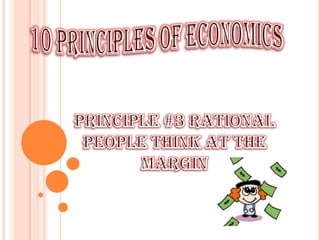Principle 3
•
0 j'aime•377 vues
Third Principles of Economics presentation
Signaler
Partager
Signaler
Partager

Recommandé
Recommandé
Contenu connexe
Tendances
Tendances (20)
Monopoly - Profit-Maximization in Monopoly - Economics

Monopoly - Profit-Maximization in Monopoly - Economics
En vedette
En vedette (20)
Complete assessment using the assessment tools of.docx unit 6 ob fianl assess...

Complete assessment using the assessment tools of.docx unit 6 ob fianl assess...
Pharmaceutical management course at universities in switzerland

Pharmaceutical management course at universities in switzerland
Certified College and Universities in United States

Certified College and Universities in United States
C:\Documents And Settings\Control\My Documents\Principles Of Economics By Ami...

C:\Documents And Settings\Control\My Documents\Principles Of Economics By Ami...
MET 401 Chapter 10 -_economics_of_power_generation_-_a._rezk

MET 401 Chapter 10 -_economics_of_power_generation_-_a._rezk
Similaire à Principle 3
The presentation explores the opportunities for environmental sustainability that exist at the very heart of any consumer society: the retail space.Designing Sustainable Retail Environments: Bridging The Gap Of Sustainability...

Designing Sustainable Retail Environments: Bridging The Gap Of Sustainability...De&Di -Integrated Marketing Services
Similaire à Principle 3 (20)
LEARNING OBJECTIVESAfter reading this chapter you should b.docx

LEARNING OBJECTIVESAfter reading this chapter you should b.docx
MKT305 Week 7 Lecture 2 Consumer Behavior Decision Making I Ne

MKT305 Week 7 Lecture 2 Consumer Behavior Decision Making I Ne
Designing Sustainable Retail Environments: Bridging The Gap Of Sustainability...

Designing Sustainable Retail Environments: Bridging The Gap Of Sustainability...
Principle 3
- 1. 10 Principles of Economics Principle #3 Rational People Think At The Margin
- 2. “Rational people systematically and purposefully do the best they can to achieve their objectives, given the opportunities they have.” - N. Gregory Mankiw Ex #1: If there are two of the same product with the same benefits the consumer will buy the cheapest one. If products are the same price the consumer will want to buy the product that has the highest benefits compared to the one with less. Ex #2: A student taking two courses has to decide on whether to split their time evenly between the two classes or take one hour away from one class to study more for the other.
- 3. Marginal Changes: Small incremental adjustments to a plan of action. Economist call small changes in a plan marginal changes. Book Ex: You already have a plan to study for you tests. You either have a choice of studying your notes for an extra hour or take that extra hour to watch TV. The book example pertains to myself as well as other students. We can either stick to our plan and study for a certain amount of time, or we decide on whether to study an extra hour for a test or watch TV, or have some free time. We make these kind of changes all the time in our lives.
- 4. Rational people make decisions only when the marginal benefit of that decision is greater than the marginal cost. That can not always be true. There are those that do not weigh the benefits of a product or item, but rather buy what they have always purchased. There are many people that just go to a store and pick whatever looks good or cheap. I know personally before the recession I or my brother would go into stores and would grab what was the first thing we found. We didn’t really look at the benefits of one item from the other.
- 5. Book Ex: Why is water so cheap, while diamonds are so expensive? The reason is that even though water is essential, the marginal benefit of an extra cup is small because water is plentiful. Diamonds are not needed to survive, but since they are rare, people consider the marginal benefit of an extra diamond. With that example I do not agree. Yes diamonds are rare, but what benefit would you get from having that extra diamond. How can a diamond be useful to a person. Yes, diamonds are beautiful and look good on jewelry, but that does not benefit a person. Water on the other hand is beneficial to everyone. Each person needs water to survive. It keeps one healthy and the benefits of it are far more essential to life than a diamond that is merely used for looks.
- 6. Ex: You have a limited amount of money to spend on grocery bills. You have a plan to buy a certain amount of items. Some things are on sale and you must decide on whether to buy more of one item or not. During the economy today many people think twice before purchasing items not on their grocery list. You think about if it is better to buy more items that are on sale but in exchange you may not have enough to buy what you had intended to get. There are many marginal changes that are made to plans such as buying groceries.
- 8. Mankiw, G. N. (2007). Principle 3: Rational People Think at the Margin. In G. N. Mankiw, Essentials of Economics 4th Edition (pp. 6-7). Thomson South-Wester.
- 9. Moffatt, M. (n.d.). Marginal Analysis. Retrieved February 6, 2011, from About.com, Economics: http://economics.about.com/od/informationforbeginners/a/marginal_analysis.htm